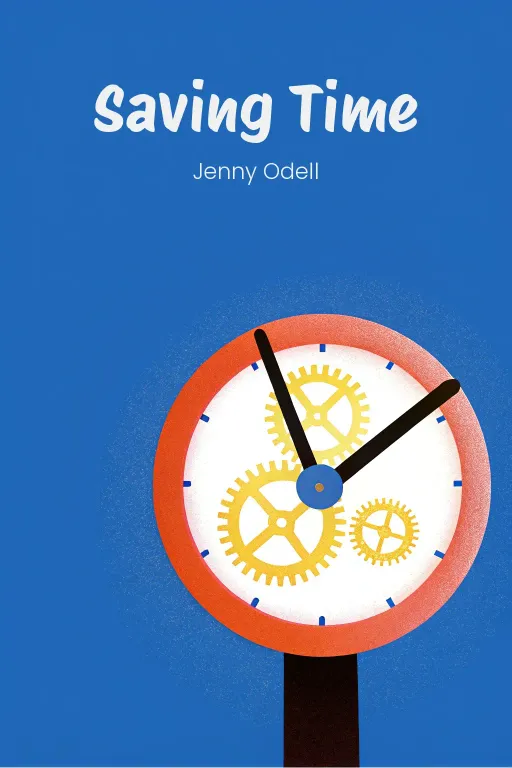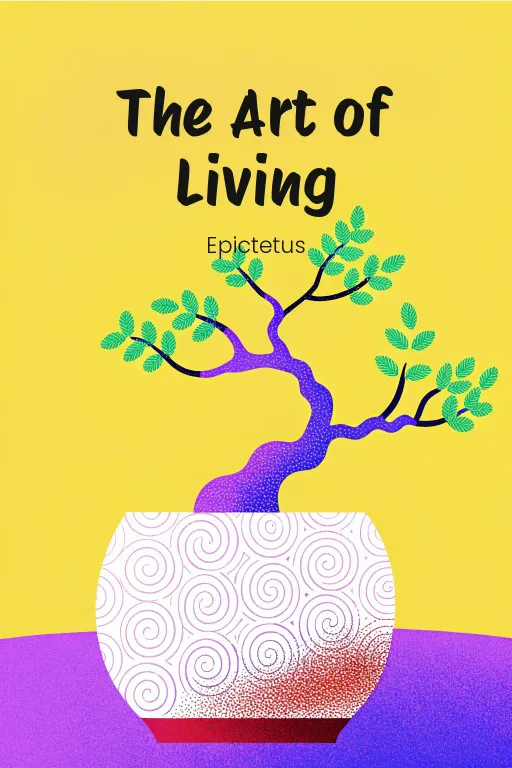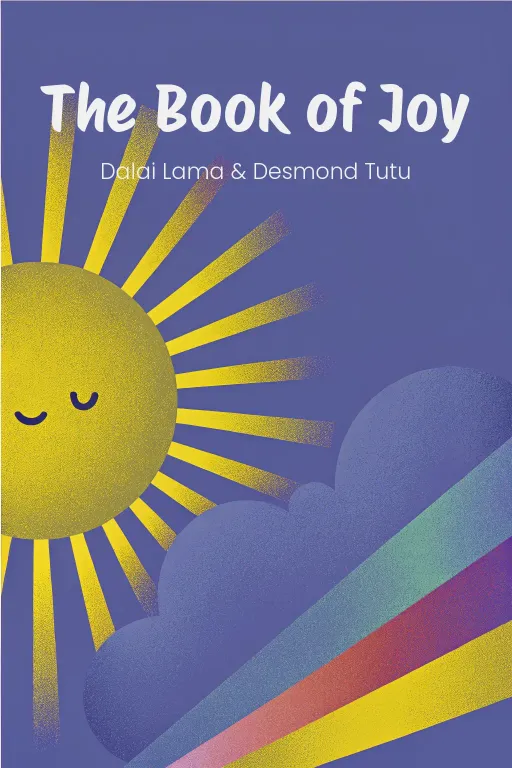
Control Your Chaos: A Stoic Guide
Podcast by Beta You with Alex and Michelle
The Classical Manual on Virtue, Happiness, and Effectiveness – A New Interpretation by Sharon Lebell
Introduction
Part 1
Alex: Hey everyone, welcome! Today we're tackling a big one: how to actually live well, you know, in this crazy, unpredictable world? Michelle: Exactly, Alex. Between the never-ending emails, the 24-hour news cycle, and just trying to figure out what to have for dinner, a little bit of wisdom would be amazing right now. Alex: Couldn't agree more, Michelle! And that's why we're diving into The Art of Living, a super practical guide based on Stoic philosophy – Epictetus' teachings, specifically. It's all about zeroing in on what is in our control – our thoughts, our actions, our attitudes – and, crucially, learning to let go of what isn't. It's not just dry philosophy; it's more like a real-world manual for living with clarity, resilience, and a sense of purpose. Michelle: Okay, a manual, huh? So, does this manual have, like, a special section for when you've, “let go” of anxieties, and then you're suddenly overcome with a craving for pizza? Just asking for a friend, of course. Alex: <Laughs> We'll definitely get there. But first, let's give everyone a quick roadmap for today. We're going to unpack five key ideas: understanding control, taming desires, embracing reality, cultivating virtue, and thriving in society. Michelle: That sounds like a handful. So, controlling what we can... Is that like, staying calm when the projector breaks five minutes before your big presentation? Alex: You nailed it! Understanding what's in your control is the absolute foundation. And then we move on to taming those endless desires. Because, let's face it, wanting everything isn't exactly a recipe for happiness. Michelle: Got it. Desires tamed. What's the next level? Alex: After that, it's all about embracing reality – seeing the world clearly, accepting things as they are, not as we wish they were. Then, we'll explore cultivating virtue, which acts as your guiding compass. It helps you navigate those tricky ethical choices life throws at you. Michelle: And thriving in society… I'm guessing that means trying to stay true to yourself, even when you feel pressure to be someone else? Alex: Bullseye! And, taken together, these steps kind of create a ladder. You know, climbing from self-mastery to actually making a positive impact on the world. So, let's start breaking it down, step by step.
Understanding Control and Responsibility
Part 2
Alex: Okay, let's dive right into the cornerstone of Stoicism: understanding control and responsibility. It all starts right here. Michelle: Yeah, that makes sense. If you haven't figured out what you “can” actually control, you're just kind of… hoping for the best, right? So, where do the Stoics draw that line, exactly? Alex: Well, Epictetus, through Sharon Lebell's explanation, gives us a pretty clear framework. The things we “do” control are internal – our thoughts, our feelings, our decisions, our actions. And the things we “don't” control? External factors, opinions of others, the weather, the economy – basically, anything that we tend to stress about, often unnecessarily. Michelle: Right, like, obsessing over whether your boss “really” liked your idea in that meeting. Classic. But, is it really that simple? Black and white? “Things I control," "things I don’t”? Feels like there's some gray area in there. Alex: Good point! Sure, it might seem blurry at first, but the key is focusing on “your” role in any given situation. For example, in that meeting, you control how well you prepare your pitch, how you present it, how you address any feedback. But your boss’s reaction? That’s totally out of your hands. Michelle: Okay, so instead of moping around because my boss had a poker face, I should be thinking, "Hey, I nailed the prep, so that’s a win"? Alex: Precisely. It’s about shifting your focus to what you “can” influence. And honestly, that shift can be really liberating. Take societal judgment, for example; so many people get caught in that trap. People constantly worrying about what their colleagues think, right? Overanalyzing comments, reading into silences… it's a recipe for misery. Michelle: Yeah, I know that person. I think I might “be” that person sometimes. But the alternative? You can’t just ignore people’s opinions if you want to keep your job or, you know, function in society. Alex: No, of course, and Stoicism isn't suggesting that! It's teaching us to center ourselves – to focus on doing our work to the best of our abilities. When you’re secure in your effort, in your integrity, the noise of other people's opinions just... quiets down. You’re not totally ignoring it, you’re just prioritizing your own standards “over” external validation. Michelle: So, let’s say I mess up at work – I “really” blow it – and my team is definitely not thrilled. Do I just say to myself, “Well, I did my best” and just move on? Alex: Well, partly. You also reflect on what's within your control to improve. If the mistake came from lack of preparation, then that's something you address for next time. If it was just something completely unforeseeable, then, yeah, you accept it as a lesson in what's beyond your control. Stoicism is about proactive responsibility, not just giving up and saying "oh well". Michelle: Got it. So, what about those gray areas, though? What about situations where it feels “impossible” to just let go? Like traffic. Okay, I roll my eyes when you talk about mindfulness, but sitting in traffic just feels aggravating on every level, right? Alex: Traffic's a perfect example! You can’t control the cars in front of you, but you “can” control your reaction, what you focus on during that time, how you use it, right? Maybe you listen to an audiobook! Or you take some slow breaths. Stoicism comes in by saying that by redirecting your energy, you're kind of reclaiming a sense of control in what seems totally uncontrollable. Michelle: Okay, so instead of honking and stewing, I put on my “Zen mode” playlist and just see it as bonus podcast time. Alex: Exactly! And over time, practicing this distinction – what “can” you control, what “can't” you – it becomes second nature and the Stoics actually suggest building a mental habit. When something occurs, immediately classify it. Is this within my control? If it's not, let it go. If it is, take action. Michelle: Hmm, easier said than done, right? I mean, it sounds kind of like a superpower – to just rewire your brain to stop sweating the small stuff. Alex: It’s not an overnight thing, definitely. It’s a practice. Stoicism is big on those daily habits of reflection and mindfulness. Epictetus would remind us again and again, freedom and happiness come from this clarity. Not from fixing the world around us, but from mastering how we respond to it. Michelle: Mastering response... okay, that's pretty deep, but I get it. So, let's talk some real-world examples here, where this mindset “really” shines. Like, when life throws a curveball, right? Say someone loses their job. How does the "focus on what you can control" thing “really” apply there? Alex: Great example. Losing a job is tough, no doubt - there's so much tied to it, emotionally and practically. But let's break it down. You can't control the decision your boss made. You can't control the economy. What you “can” control is how you react to it. Do you let it send you spiraling, or do you see it as an opportunity to learn new skills, update your resume, or even explore other passions? Michelle: Easier said than done when the bills are piling up, though. Alex: True. And Stoicism is not about minimizing hardship; it's about reframing it and actually finding power in it. Epictetus called these moments opportunities to strengthen our character. Yes, it's a setback, but “your” response is the new foundation. Reclaiming what control you “can”, building that momentum – that's empowering in itself. Michelle: So, it’s like saying, "Okay, what's done is done. Now, what can I actually “do” about this?" Alex: Absolutely. And “that” mindset, “that” focus fosters resilience. Think about a sports team manager. They can't control injuries, bad calls, or even just plain bad luck. But what they “can” control is how they train the team, strategize during games, support the players. Whether the outcomes are a win or a loss, they focus on doing “their” part well and letting the rest unfold. Michelle: That makes sense. But it feels kind of like-- I don’t know-- a tall order for someone “really” stuck in the frustration phase, right? Any advice for “really” helping someone get past that first hurdle? Alex: That’s fair. I think, for starters, it's about self-compassion, and a little breathing room - acknowledging the frustration instead of trying to amplify it, right? Gradual challenging of your own perspective. Remind yourself: "I can't change what happened, but I “can” still change my narrative from here." It's about creating a space between initial reaction and response. Michelle: Alright, so this Stoic control framework isn't saying, like, "Stop caring." It's saying, "Start caring “wisely”." Focus on what's possible without losing yourself over what's not. Alex: Exactly, and it's doable for anyone, really. We just have to practice distinguishing between those two things. And doing that consistently brings freedom, stability, and even joy despite all of life’s constant unpredictabilities.
Managing Desires and Building Habits
Part 3
Alex: Now that we have a clearer understanding, let’s dive into managing our desires. These desires, you know, they really drive our emotional responses. Managing them builds on that control thing we talked about – you know, focusing on what we can actually influence. It’s about governing those internal forces that make us tick. And that leads us nicely into acceptance – really embracing life as it is. Michelle: I'm tracking with you. So, is the idea here really just learning to “not” want anything? Because, I gotta say, that sounds kind of depressing. Alex: Not at all! Stoicism isn’t about just squashing your desires. It's more about…reframing them. Epictetus said that the trouble starts when our desires are focused on things we “can't” control. That just leads to anxiety, disappointment, all that bad stuff. Like, chasing after wealth or other people's approval – you quickly realize how much of that is out of your hands. Michelle: Yeah, I hear that. We all know someone who's poured their soul into getting that promotion, and when it doesn't happen, it's like their world implodes. So, how do you just…stop wanting something like that? Isn't that just human nature? Alex: Totally human! But a Stoic approach would be to sort of...redirect that desire. Instead of making that promotion your everything – since it's external – put your energy into what “is” in your wheelhouse: doing your job well, sharpening your skills, you know, acting with integrity. That way, even if you don’t get the promotion, you've still built something solid – self-mastery. Michelle: So, it’s like focusing on the journey, not the destination? Sounds nice, but let’s get real. What about a student who is dead set on graduating top of their class? Telling them to “enjoy the learning process” feels a bit… unhelpful when they are drowning in essays and all-nighters. Alex: True, but think of it this way: The Stoic student isn’t ignoring their goals. They're just…reframing them. Instead of fixating on being number one, which depends on external factors like grading curves or even a professor's mood, they zero in on what “they” can control: studying hard, expanding their knowledge, getting better at what they do. That outlook not only eases anxiety about rankings but also boosts their own motivation. Michelle: So, it’s not about ditching ambition, but about detaching from the obsession with the outcome? Asking yourself, “What’s my effort worth if everything doesn’t go exactly as planned?” Alex: Exactly! And beyond reframing desires, another Stoic tactic for managing them is negative visualization. Have you heard of it? Michelle: Negative visualization? Sounds like turning a relaxing afternoon into a therapy session. What exactly are we visualizing here? Alex: It’s about imagining what it would be like to “not” have what you desire or value. It's not about dwelling on the negative, but about gaining perspective. Say someone is lusting after that fancy car, convinced it'll bring them pure joy. Negative visualization would have them think about the downsides: the cost, the maintenance, how quickly that "new car smell" fades. By facing those possibilities, they dial down the intensity of their desire and dodge those emotional rollercoasters. Michelle: So, you're killing the dream to protect yourself from…disappointment? Bit harsh, isn’t it? Alex: It’s not about killing the dream, but seeing it clearly. Once you realize that some external desires might not deliver what they promise, or might even bring new headaches, you're less enslaved to them. Then you can shift your focus to things that matter more, things you actually have some control over. Michelle: Okay, that makes sense for, like, big extravagant desires. But what about the everyday stuff? Like, stress-eating when you’re swamped. You aren’t going to negative-visualize a bag of chips away, are you? Alex: No need to demonize chips! But let's talk about that. Stoicism suggests that desires and aversions aren't set in stone—they're habits we can change. Take someone who reaches for those comfort-food snacks late at night. By being aware of that connection, they could swap it for something healthier – journaling, maybe, or a cup of tea. Over time, that new habit can take hold as they find comfort in less harmful things. Michelle: Right, so it’s not just willpower alone—it’s about having a doable alternative ready. I bet “that” takes time. I mean, those habits are wired deep. Alex: Exactly. Which is where mindful repetition comes in. It's a long game of rewiring yourself, but each small step counts. Stoics stress being patient with habit formation – it won’t happen overnight, but every consistent action reinforces that shift. Michelle: Okay, let me throw another one at you. What if the desire is tied to relationships? Like, needing constant reassurance from your partner that they love you. That’s a tough one to rewire because your emotions are all tangled up in it. Alex: Absolutely, and that's where Stoicism gets interesting. Instead of chasing reassurance, the focus turns inward. Picture someone in this situation. Instead of constantly fishing for compliments or validation, they could put that energy into being kinder, more patient, more understanding, you know? Their actions are about improving themselves, not extracting something from their partner. Michelle: So, instead of saying, “Do they love me enough?” they’d ask, “Am I acting in a way that shows love and virtue?” Alex: Precisely. Not only does that ease anxiety, but it often strengthens the relationship, too. Because instead of depending on outside approval, they are grounding themselves in – something way more stable – their own actions and values. Michelle: And I’m guessing this philosophy doesn’t stop at managing desires. You also need to learn acceptance, like when something you cherish is lost? Alex: Absolutely—Epictetus keeps reminding us that everything we have is temporary. Nothing truly belongs to us, not even our most prized possessions. Thinking of them as "on loan" can cushion the fall when they're gone. Michelle: So, if I lose something, like a family heirloom, I remind myself it was never really “mine” to begin with? Alex: Right, and focus on what it symbolized, not the object itself. This acceptance frees us from being overly attached and lets us value things for what they are in the moment, without clinging to them. Michelle: I can appreciate that. It’s not about building walls to feel less – it’s about shifting how you see things. Feels like there’s a lot here to chew on. Let’s quickly recap the big picture.
Cultivating Acceptance and Clear Perspective
Part 4
Alex: So, naturally, this brings us to the heart of today's discussion: cultivating acceptance and a clear perspective. This is really about aligning ourselves with reality. It's not about getting stuck in how we wish things were, but rather, seeing things as they are, with real clarity. Epictetus underscored this as essential for emotional resilience and, frankly, living ethically. Michelle: Okay, so is this basically a "just go with the flow" kind of philosophy? Make peace with the chaos, maybe even smile at disaster, and then just move on? Alex: Not exactly, Michelle. Stoicism isn't really about passive resignation. It's actually quite active. It's more about adopting a mindset that embraces life as it unfolds, reframing those hardships into opportunities and, resistance into understanding. Let's unpack this mindset, bit by bit, starting with the very nature of acceptance itself. Michelle: Sounds good, because some things just feel… well, unacceptable. Take, for example, losing something incredibly meaningful. How does acceptance actually ease that kind of suffering? Alex: Perfect example. Picture someone losing a family heirloom, something truly irreplaceable, that has been treasured for generations. The natural first response? Grief, devastation, right? That's because the object embodies not just monetary value, but also really deep emotional ties. Michelle: Absolutely. I'm thinking about the bracelet my grandmother gave me. Losing something like that would sting. Alex: Exactly, it would. But here's where acceptance can really shift your perspective. Instead of dwelling on the fact that this object is gone, Epictetus might encourage that person to really reflect on the memories that it symbolized. These memories are untouchable. No one can take away what they truly mean. Michelle: So, are you saying it's not about the bracelet itself but the story that it tells, the family connection that it represents? Alex: Precisely. By reframing the loss, you can focus on what really lasts. The key here is to free yourself from attaching your happiness to the physical thing. Once you recognize that all possessions are temporary and instead honor the symbolic value that they hold, peace can actually follow. It's a subtle but truly transformative shift. Michelle: And this applies across the board? Even to bigger, really life-altering losses? Alex: Look, it's not magic, so it doesn't erase the pain. But, yes, over time, a genuine embrace of impermanence actually helps you release resistance and find acceptance. Take an athlete who has a career-ending injury. They might redefine their purpose, by coaching, mentoring, or innovating in new fields. By reframing their loss, they can regain control of their own story. Michelle: So, translation: “Okay, this happened. What can I rebuild from here?” Seems like a simple question, but the implications are huge. But doesn't this kind of philosophy risk becoming apathy? Like, if I start brushing off every setback by just saying, "That's life," what's to stop me from becoming completely numb? Alex: That's such a good point. True acceptance isn't about numbness, it's actually about clarity. And clarity can empower you to take action. That distinction really matters. Acceptance doesn't mean shrugging your shoulders and stepping back. It actually means stepping forward with real purpose, guided by what you can influence, rather than what's out of your reach, right? Michelle: Okay, that makes much more sense now. So, instead of obsessing over losing control, you channel your energy into the present, right? What about some tools on how to actually get there? How can I train my brain to reframe this loss or disappointment when my emotions are truly running wild? Alex: Epictetus suggests a few, really practical methods. One is simply reframing your thoughts in the moment, pausing and asking yourself, "Is this situation truly unbearable, or am I, maybe, just making it that way through my own perceptions?" That quick moment of reflection can create space between what happens and how you react. Michelle: Wait, are you telling me that when I miss a flight, I should just breathe and think, "Maybe this isn't as awful as it seems"? Alex: Pretty much! Missing the flight itself isn't necessarily a problem. You're adding layers of frustration with thoughts like, "This is going to ruin the whole week" or, "I always have the worst luck." By taking away these kinds of exaggerations, you actually soften the emotional blow. And, in reality, you've just gained some unexpected time to problem-solve or just relax. Michelle: Fair point. I guess jumping straight to the worst-case scenario is optional. It sure feels automatic at times, though. Alex: That's where practice comes in. You need to train yourself to be able to identify and neutralize those distortions in your thinking. Another Stoic tool is negative visualization, which sort of preemptively shifts your perspective. Michelle: Ah, so “imagine the worst” kind of technique. Sounds a little grim, but I'm curious, how does that actually help? Alex: By facing potential losses in a controlled, thoughtful way, you actually condition yourself to embrace gratitude and have less fear. Take parents, for example. If they reflect on the temporary nature of parenthood, knowing that one day their children will grow up and leave home, it can help them cherish all those moments of togetherness even more deeply. Michelle: That's… surprisingly profound. Instead of clinging to every moment, you savor it, knowing that it's not going to last forever. Alex: Exactly. It's about embracing the fact that everything is temporary as a part of life, it isn't the enemy. When you have this clear outlook, you're better ready to accept those transitions as they come. Michelle: Okay, alright, I'll admit I can see how these techniques can reshape your perspective. But, what if I'm in a situation where, say, someone disrespects me – like, a friend snaps at me rudely over dinner. How does calling things by their "right names," like Epictetus said, play into that? Alex: First, try not to overreact by assigning a motive. Maybe they were just having a bad day. By really reassessing the situation objectively, you can strip the event of all that unnecessary emotional baggage. In the end, it was just a single moment of rudeness, not an assault on your character. That kind of clarity can prevent a spiral of resentment. Michelle: Makes sense. So, instead of just letting my emotions run wild, I’d say, "Okay, that wasn't ideal, but it's not the end of the world." This can save me from making things a lot worse. Alex: Precisely. Stoicism really thrives on that kind of composure. It actually builds bridges of understanding rather than burning them to the ground. And even beyond the actions of others, we can apply this same reasoning to life itself. When we view those setbacks realistically, it really helps us maintain balance through all that chaos. Michelle: Alright, I'm convinced – well, not entirely, maybe. But, I do see the value in separating my perceptions from what is actually real. This philosophy definitely requires dedication, though. It's almost like hitting the emotional gym every day to make yourself emotionally stronger. Alex: Well said, Michelle! Emotional strength comes through discipline, and Stoicism can provide that solid framework. With that kind of clarity and acceptance, you can lay a strong foundation for navigating life's uncertainties and even thriving, right in the middle of them!
Inner Excellence and Virtue
Part 5
Alex: So, with this mindset in place, we can really focus on developing those inner virtues that define true excellence . This is where Epictetus shifts gears, right? He wants us to focus on inner qualities that shape not just our lives, but also how we interact with others and contribute to the world . Michelle: Inner virtues…sounds noble, but also a bit…abstract . Alex, are we basically talking about being a “good person?” And at what point does that become just another cliché? Alex: It’s definitely deeper than just being ‘good,’ Michelle . For Epictetus, virtue isn't some vague concept, but cultivating qualities like courage, patience, wisdom, and integrity . And more importantly, aligning our actions with those principles . Think of it like an ethical compass guiding everything – from our personal choices to how we engage with the world . Michelle: Okay, but here’s the thing: the world isn’t exactly designed for “virtue.” I mean, a lot of the time, people succeed by playing by rules that… well, let’s just say they're not always virtuous . So, is cultivating virtue just setting yourself up for failure in the real world? Alex: That’s a very common concern ! But the Stoics actually redefine 'success' here . True excellence isn’t about external rewards – it’s about becoming the kind of person who acts rightly, no matter what . Imagine someone at work who refuses to compromise their values, even if it means missing out on a promotion . They’re not “losing,” they’re staying true to themselves . And that’s a kind of achievement that lasts way longer than any title . Michelle: I get it… But if that person's moral stance gets them fired, I doubt they'll be feeling too excellent while they're job-hunting . Is Epictetus basically saying that external success doesn't matter at all? Alex: Not really . External success can have value, especially if it lines up with your values . But Stoicism challenges us to not base our sense of worth on those fleeting things – things like titles, wealth, or popularity . If we do, we risk getting caught in this endless cycle of anxiety, constantly chasing things we don't even have full control over . Michelle: So it's like that classic story, right? The person who spends their whole life chasing the trophies and status, and then realizes: "Wait, this didn't actually make me happy." Alex: Exactly . And Epictetus would probably say the problem isn't being ambitious, but having the wrong kind of ambition . So, take that person again . And shift their focus from climbing the corporate ladder to developing a sense of character, making a difference to others, or gaining wisdom . They’re going to find fulfillment in what those pursuits teach them about themselves, not just the trophies . Michelle: Alright, point taken . But let’s make this more real . Can you give me an example of someone living virtuously, according to the Stoics? Not some grand act of heroism, but something tangible, you know? Alex: Sure ! How about a volunteer teacher, working with kids in an underserved community? Someone who dedicates their energy to shaping young minds, not for money or recognition, but because they believe in education and opportunity . They’re demonstrating patience, courage, and integrity, even if they don’t get any awards for it . Now, that's virtue in action – matching your actions with your values, regardless of the rewards . Michelle: I’m with you on that, the whole “virtue is its own reward” idea . Though it feels kind of saintly for most folks . I mean, for most of us, our moral choices are smaller, mundane . Like, deciding whether to lie to avoid an uncomfortable conversation . Or whether to return the extra change the cashier gave me . Alex: And that’s what’s so great about it . Stoicism isn’t about waiting for these huge, dramatic life tests to show virtue . It’s about the daily choices . Returning that extra change? That's honesty . Over time, these smaller decisions build character, creating an internal sense of worth . Michelle: Okay, but how does Stoicism deal with those times when decisions aren’t so clear-cut? Cases where ethics collide, you know? Like, maybe you're in a situation where helping one person means hurting another . How does virtue guide you there? Alex: That’s a really important question . The Stoics know those complex situations can challenge us . That’s when reflective accountability is key . You thoughtfully assess the situation: What’s the most courageous, the most just, and the most honest thing to do here? It might not lead to a perfect outcome, but acting with integrity—using virtue as your guide—helps you navigate those moral gray areas . Michelle: Reflective accountability… is that a fancy way of saying "think before you act”? Alex: <Laughs> Kind of, yes! It’s about going beyond just snap judgments, considering whether your actions truly align with your core values . One practice Stoicism encourages is journaling – taking a few minutes each day to ask, "Was I fair today? Was I patient?" This self-awareness builds resilience . Michelle: Wow . So, instead of tossing and turning, replaying all the awkward moments of my day, I should grab a journal and start critiquing myself like I’m my own coach? Sounds intense . Alex: It might seem that way at first ! But it's less about strict criticism and more about learning . It's a tool for honest self-reflection, not self-punishment . It’s like tracking progress at the gym . You’re building moral and emotional strength by looking at your actions and deciding where you can grow . Michelle: I like the idea in theory . Although, in practice, it feels like a lot of pressure . What happens if I just… fall short of virtue, even when I try? Do I just chalk it up to being human? Alex: Exactly ! The Stoics weren’t perfectionists, and they knew virtue is a journey, not a destination . Even Epictetus believed those stumbles are part of it . When you fall short, it’s a chance to reassess, adjust, and try again . After all, growth happens in the trying, not the achieving . Michelle: Okay, so virtue is about the consistent effort, not about achieving some unattainable perfection . And the reward is a sense of fulfillment that those external things can't give you . That sounds... liberating, actually . Hard, but liberating . Alex: That’s exactly what makes it timeless . When we cultivate virtues like integrity, patience, and courage, we’re grounding ourselves in something unshakable, regardless of life’s ups and downs . It’s a way of living that doesn’t just bring us personal fulfillment, but also a meaningful impact on others and the world . Michelle: Okay, I’ll admit, this has me re-thinking some things . Maybe chasing those fleeting rewards isn’t where excellence really lies . Maybe the real victory is becoming someone you’re proud to be, no matter how the world measures you . Alex: Beautifully said, Michelle . And that shift—from chasing external success to cultivating that inner excellence—that's what transforms not just our perspective, but how we live every single moment .
Interpersonal Ethics and Societal Authenticity
Part 6
Alex: So, yeah, this dedication to virtue? It really empowers us to connect with others and society in a genuine way. Which brings us to today’s theme: interpersonal ethics and societal authenticity. We’re diving into how Stoicism guides us to navigate relationships and society with courage, clarity, and a real commitment to our core values. Michelle: Okay, so we're moving from, "fix yourself" to "be a decent human in the real world," right? Which, let’s be honest, is way easier said than done when, you know, society practically rewards superficiality. So, what’s the game plan here exactly? Alex: Right. Well, in this section of The Art of Living, we're focusing on three key ideas: resisting societal conformity, building strong, meaningful relationships, and really contributing to the community in a genuine way. And we’ll wrap up by looking at the bigger picture – how Stoicism helps us find that sweet spot between being true to ourselves and our responsibilities to others. Michelle: Alright, let's dive into resisting conformity first. Because, seriously, most people are constantly fighting against social pressures, right? From their career choices to the number of likes on Instagram, it's a never-ending "what does everyone else think?" Alex: Absolutely. And Epictetus challenges us to step back from that tug-of-war by asking ourselves, "What really matters to you?" He uses this really clever metaphor about choosing shoes. What’s the takeaway? Don’t choose something flashy or trendy if it doesn’t actually fit you. Pick what's comfortable and practical for your journey, even if it’s not what everyone else is doing. Michelle: Ah, the equivalent of saying, "Stop buying those insane shoes you’ll never wear." Okay, but how does that actually translate into real life? Alex: Well, think about societal expectations, especially for women. A lot of times, society ties a woman’s worth to her appearance, which fuels this constant competition over beauty instead of encouraging intellect, resilience, kindness, those sorts of things. It's exhausting, and it just kind of eats away at you. Michelle: Yeah, totally, and it's everywhere, right? From magazine ads to, you know, those filters people use on social media. So, what’s the Stoic advice here? Do we just go full-on rebel and reject all those expectations? Alex: Not quite rebellion, but more like redirection. Instead of pouring all that energy into keeping up appearances, Stoicism encourages women—and honestly, everyone—to cultivate their inner qualities. It’s about reclaiming your value by grounding it in things you can control, like wisdom, curiosity, courage—qualities that last way longer than any fleeting trend. Michelle: So, basically, stop chasing validation that disappears faster than a Snapchat story, and start building qualities that can’t be taken away. But I can already hear the pushback: "What’s the harm in playing the social game if it helps you get ahead?" Alex: The harm is that you might lose yourself in the process. Sure, getting approval from society might bring some temporary rewards—like attention or status. But what’s the cost? If you’re sacrificing your authenticity to fit in, you might end up successful but feeling totally empty inside. Stoics remind us that lasting fulfillment comes from living true to your values, not someone else’s expectations. Michelle: Alright, fair enough. I guess you can keep up with appearances without letting them define you. But what about relationships? That’s where things get messy, especially when you feel like other people's opinions and actions are completely out of your control. Alex: Exactly, that's why Stoicism encourages us to be intentional about who we surround ourselves with. It’s not about avoiding other people's drama, but rather choosing relationships that lift you up instead of draining you. Epictetus believed that the people you’re around really shape who you are, for better or worse. Michelle: So, what if you figure out that one of your long-time friendships is actually kind of toxic? Like, maybe they’re always critical or just never supportive. Does Stoicism just say, "Cut your losses"? Alex: Not necessarily. It suggests honest reflection first. Ask yourself: Is this relationship helping me grow as a person? If the answer is no, even after you’ve set boundaries, then the Stoic response is to put your well-being first and step back. Letting go doesn’t mean you’ve failed; it just means you’re making room for healthier, more supportive connections. Michelle: Okay, that makes sense for dealing with the energy vampires in your life. But what about the relationships that you actually want to keep, like family? Is there a secret formula for balancing those dynamics? Alex: Well, Stoicism suggests that meaningful connections take effort and presence. Think about a father who works crazy hours but makes sure to set aside uninterrupted weekends to go hiking with his kids. It’s not just about spending quality time; it’s about passing on shared values like mindfulness and resilience. That kind of intentionality creates bonds that are based on authenticity and mutual growth. Michelle: So it’s about showing up consistently and on purpose. Got it. Then I guess that same kind of authenticity applies to how Stoicism views our role in society, right? Living beyond just personal gain? Alex: Absolutely. Epictetus doesn’t see authenticity as something that's purely individual. It extends to the community, urging us to act with integrity and generosity, even when nobody's watching. The Stoic way of looking at civic responsibility is about creating little ripples of goodwill, no matter how small. Michelle: That sounds nice, but how do you motivate yourself to contribute without craving recognition all the time? Let's be real – most people appreciate a pat on the back. Alex: Yeah. That’s where alignment comes in. The goal of contributing to your community isn’t to get applause—it's about embodying the virtues you value most, like empathy or compassion. Stoics remind us that genuine community involvement means giving for the sake of giving, not for the validation. Michelle: Okay, let’s bring it all together. You resist societal pressures, you build healthy relationships, and you contribute genuinely. What’s the end result? Alex: A life that feels rich with purpose. By focusing on authenticity—whether it’s in your personal identity, your relationships, or your wider community—you rise above the chaos and live with clarity, courage, and fulfillment, no matter what's going on around you. Michelle: So living authentically isn’t just about protecting yourself from the traps of society, it’s about building something meaningful with others. Simple, but not easy. Alex: Exactly! And that’s what makes it so worthwhile: a way of living that not only enriches your own life but also the world around you.
Conclusion
Part 7
Alex: Okay, so to bring everything together today, we’ve really dug into some key lessons from “The Art of Living”. We talked about figuring out what you can actually control versus what you can't, managing your desires effectively, practicing acceptance, and, importantly, how to reframe the way you see things. Then we looked at pursuing inner excellence and virtue—making that the core of a good life—and finally, how Stoicism helps us build real relationships and contribute something meaningful. Michelle: Yeah, if you boil it down, the Stoics seem to be saying, "Look, quit stressing about stuff you can't change. Channel that energy into what you can influence, and let your actions, your virtue, define you—not your job title or what other people think." Oh, and remember to appreciate the small things, because, well, nothing sticks around forever, does it? Alex: Precisely! Stoicism isn’t about pretending life is all sunshine and rainbows. It’s about giving you the tools to handle the tough stuff with courage, clear thinking, and a sense of purpose. It’s a hands-on philosophy that actually helps you flourish, even when things are a bit crazy. Michelle: Okay, so here’s a practical takeaway for our listeners: throughout the day, just ask yourself, "Can I actually do anything about this?" If the answer's yes, then tackle it head-on. But if it's a no, then practice letting it slide. It's easier said than done, believe me. Although, that's where you find real freedom, isn't it? Alex: Exactly, Michelle. By making these little mental adjustments, we can live with more purpose, more patience, and more authenticity. Thanks for tuning in today, everyone. We hope our chat encourages you to embrace both the art—and the “practice”—of living well.









